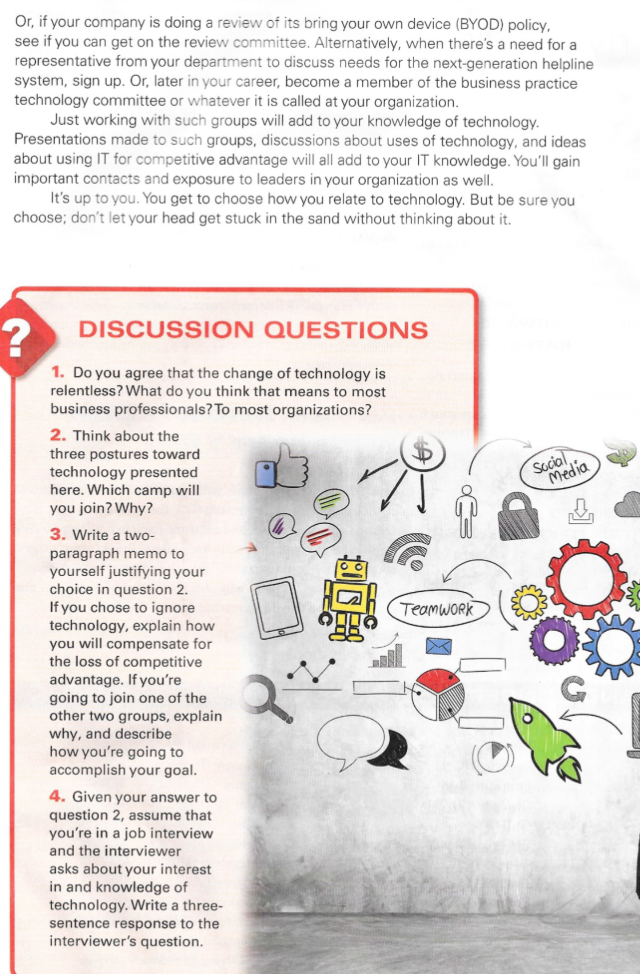Answered step by step
Verified Expert Solution
Question
1 Approved Answer
i need to read this case and answer these questions. please help. the questions should be answered in detail and add up to a page.


i need to read this case and answer these questions. please help. the questions should be answered in detail and add up to a page.
ave you ever been to a cafeteria where you put your lunch tray on a conveyor belt that carries the dirty dishes into the kitchen? That conveyor belt is reminiscent :echnology. Like the conveyor, technology just moves along, and all of us run on top the technology conveyor, trying to keep up. We hope to keep up with the relentless ange of technology for an entire career without ending up in the techno-trash. Technology change is a fact, and the only appropriate question is, "What am oing to do about it?" One strategy you can take is to bury your head in the sand: ook, I'm not a technology person. I'll leave it to the pros. As long as I can send email d use the Internet, I'm happy. If I have a problem, I'll call someone to fix it." That strategy is fine, as far as it goes, and many businesspeople have used it. Illowing that strategy won't give you a competitive advantage over anyone, and it will give someone else a competitive advantage over you, but as long as you develop your advantage elsewhere, you'll be OKat least for yourself. What about your department, though? If an expert says, "You should be buying your employees Windows 10 tablet devices," are you going to nod your head and say, "Great. Sell'em to me!"? Or are you going to know enough to realize that it may be too early to know what the success of Windows 10 will be? Or to know that maybe you'll have problems getting homegrown, in-house applications down from whatever stores Microsoft sets up? At the other end of the spectrum are those who love technology. You'll find them everywhere - they may be accountants, marketing professionals, or productionine supervisors who not only know their field but also enjoy information technology. Maybe they were IS majors or had double majors that combined IS with another area of expertise (e.g., IS with accounting). These people read CNET News and ZDNet most days, and they can tell you the latest on desktop virtualization or htm/5 or Windows 10 . Those people are sprinting along the technology conveyor belt; they will never end up in the techno-trash, and they will use their knowledge of IT to gain competitive advantage throughout their careers. Many business professionals fall in between these extremes. They don't want to bury their heads, but they don't have the desire or interest to become technophiles (lovers of technology), either. What should you do if you fall into this category? There are a couple of strategies. For one, don't allow yourself to ignore technology. When you see a technology article in The Wall Street Journal, read it. Don't just skip it because it's about technology. Read the technology ads too. Many vendors invest heavily in ads that instruct without seeming to. Another option is to take a seminar or pay attention to professional events that combine your specialty with technology. For example, when you go to the bankers' convention, attend a panel or two on "Mobile Device Use at Banks." There are always sessions like that, and you might make a contact with similar problems and concerns in another company. Probably the best option, if you have the time for it, is to get involved as a user representative on technology committees in your organization. Or, if your company is doing a review of its bring your own device (BYOD) policy, see if you can get on the review committee. Alternatively, when there's a need for a representative from your department to discuss needs for the next-generation helpline system, sign up. Or, later in your career, become a member of the business practice technology committee or whatever it is called at your organization. Just working with such groups will add to your knowledge of technology. Presentations made to such groups, discussions about uses of technology, and ideas about using IT for competitive advantage will all add to your IT knowledge. You'll gain important contacts and exposure to leaders in your organization as well. It's up to you. You get to choose how you relate to technology. But be sure you choose; don't let your head get stuck in the sand without thinking about it. DISCUSSION QUESTIONS 1. Do you agree that the change of technology is relentless? What do you think that means to most business professionals? To most oraanizations? 2. Think about the three postures toward technology presented here. Which camp will you join? Why? 3. Write a twoparagraph memo to yourself justifying your choice in question 2. If you chose to ignore technology, explain how you will compensate for the loss of competitive advantage. If you're going to join one of the other two groups, explain why, and describe how you're going to accomplish your goal. 4. Given your answer to question 2, assume that you're in a job interview and the interviewer asks about your interest in and knowledge of technology. Write a threesentence response to the interviewer'sStep by Step Solution
There are 3 Steps involved in it
Step: 1

Get Instant Access to Expert-Tailored Solutions
See step-by-step solutions with expert insights and AI powered tools for academic success
Step: 2

Step: 3

Ace Your Homework with AI
Get the answers you need in no time with our AI-driven, step-by-step assistance
Get Started


